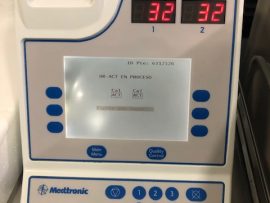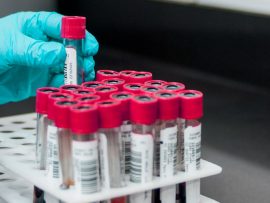Abstract Background: Unfractionated heparin (UFH) is the standard anticoagulant during cardiopulmonary bypass (CPB). A clinically relevant subset develops heparin resistance (HR)—failure to reach adequate anticoagulation with usual UFH—raising thrombotic risk..
Read MoreAbstract Background: Unfractionated heparin (UFH) is the standard anticoagulant during cardiopulmonary bypass (CPB). A clinically relevant subset develops heparin resistance (HR)—failure to reach adequate anticoagulation with usual UFH—raising thrombotic risk..
Read MoreAbstract The 2021 Adult and Pediatric Anticoagulation Guidelines for patients on extracorporeal membrane oxygenation (ECMO) recommend a target partial thromboplastin time (PTT) between 60 and 85 seconds when unfractionated heparin..
Read MoreAbstract Objectives According to the manufacturer, the Hemochron ACT-LR cuvette is designated for heparin concentrations of 0 to 2.5 IU/mL, while the optimal concentration range for the ACT+ cartridge is..
Read MoreAbstract Introduction The recently recommended activated clotting time (ACT) to be maintained at the initiation of and during cardiopulmonary bypass (CPB) is ≥480 s. However, the post-unfractionated heparin (UFH) administration ACT..
Read MoreAbstract The term heparin resistance is likely best defined as the failure of an appropriate dose of unfractionated heparin (UFH) to achieve a predetermined level of anticoagulation. Unfortunately, and despite..
Read MoreAbstract Introduction No clear guidelines exist for unfractionated heparin (UFH) monitoring in adult patients on veno-arterial extracorporeal life support (VA-ECLS) for refractory cardiogenic shock. In this study, we sought to..
Read MoreAbstract Background Evidence supporting with unfractionated heparin (UFH) in patients with an intra-aortic balloon pump (IABP) to prevent remains limited, while bleeding risks remain high. Monitoring heparin in this setting with anti-factor..
Read MoreAbstract Unfractionated heparin (UFH) and its low-molecular-weight fragments (LMWH) are widely used as anticoagulants for surgical procedures and extracorporeal blood purification therapies such as cardiovascular surgery and dialysis. The anticoagulant..
Read MoreAbstract Unfractionated heparin (UFH) was uncovered in 1916, has been used as an anticoagulant since 1935, and has been listed in the World Health Organization's Model List of Essential Medicines...
Read MoreAbstract In unfractionated heparin (UFH) monitoring during extracorporeal circulation, the traditional measures of activated clotting time (ACT) or activated partial thromboplastin time (APTT) may diverge, confounding anticoagulant adjustments. We aimed..
Read MoreAbstract Bleeding and thrombotic complications are major drivers in extracorporeal life support (ECLS) patients’ negative outcomes and are reported in up to 40% of the ECLS-runs [1, 2]. Consumptive coagulopathy..
Read MoreAbstract Introduction Andexanet alfa (AA) - zhzo, recombinant coagulation factor Xa, is an approved antidote for oral Xa inhibitors (apixaban and rivaroxaban). Unfractionated heparin (UFH) is commonly used for therapeutic,..
Read MoreAbstract Background The presence of dextran sulfate (DS) in reagents and the type of blood collection tube (citrate/citrated-theophylline-adenosine-dipyridamole [CTAD]) can lead to discrepancies between unfractionated heparin (UFH) anti-Xa levels. Objectives ..
Read MoreAbstract Background Unfractionated heparin (UFH) is commonly used during cardiac surgery with a cardiopulmonary bypass to prevent blood clotting. However, empirical administration of UFH leads to variable responses. Pharmacokinetic and..
Read MoreAbstract Unfractionated heparin (UFH) is the most used anticoagulant in patients receiving veno-venous extracorporeal membrane oxygenation (VV-ECMO). Its therapeutic levels are monitored using activated partial thromboplastin time ratio (aPTTr) or..
Read MoreAbstract Because of its rapid onset and offset of action, and its ability to be fully and rapidly reversed with protamine when anticoagulation control is needed, unfractionated heparin (UFH) remains..
Read MoreAbstract Background: Unfractionated heparin (UFH) is an anticoagulant drug that is considered a high-risk medication because an excessive dose can cause bleeding, whereas an insufficient dose can lead to a..
Read MoreAbstract Aims Unfractionated heparin (UFH) has been the primary anticoagulant of choice on extracorporeal membrane oxygenation (ECMO). However, it is debatable whether bivalirudin (BIV), a direct thrombin inhibitor, may be..
Read MoreAbstract Purpose: To evaluate unfractionated heparin (UFH) dosing guided by antifactor Xa levels during targeted temperature management (TTM) post-cardiac arrest. Methods: Single-center, retrospective, observational study between January 1, 2014 and..
Read MoreAbstract Background: The optimal monitoring strategy for anticoagulation management in extracorporeal membrane oxygenation (ECMO) remains a clinical controversy. The Extracorporeal Life Support Organization Anticoagulation Guidelines suggest that multiple anticoagulation assays..
Read MoreAbstract Introduction Unfractionated heparin is widely used as an anticoagulant for extracorporeal life support (ECLS) and usually monitored with activated partial thromboplastin time (aPTT). Due to its limitations in pediatric..
Read MoreAbstract OBJECTIVES: Extracorporeal membrane oxygenation is a life-sustaining therapy for severe respiratory failure. Extracorporeal membrane oxygenation circuits require systemic anticoagulation that creates a delicate balance between circuit-related thrombosis and bleeding-related..
Read MoreAbstract Background: Unfractionated heparin (UFH) is widely used as a reversible anti-coagulant in cardiopulmonary bypass (CPB). However, the pharmacokinetic characteristics of UFH in CPB surgeries remain unknown because of the..
Read MoreAbstract Objectives: Extracorporeal membrane oxygenation is a life-sustaining therapy for severe respiratory failure. Extracorporeal membrane oxygenation circuits require systemic anticoagulation that creates a delicate balance between circuit-related thrombosis and bleeding-related..
Read More











